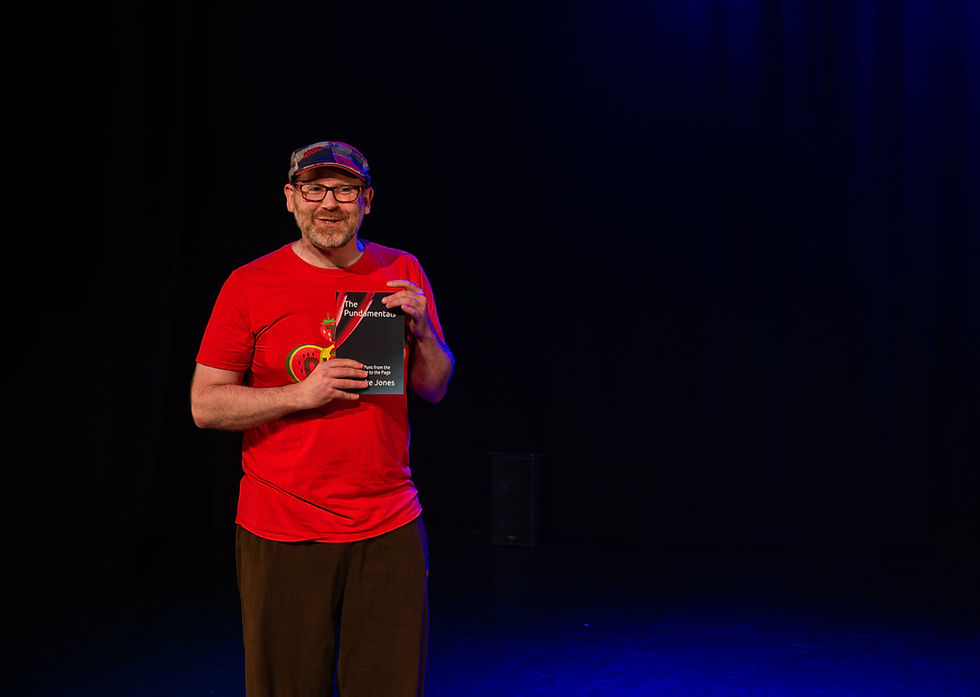You’re Looking at It All Wrong: Life Lessons from a Small Blue Worm
- Iain Luke Jones
- Oct 16, 2025
- 3 min read

When I was a child, my heroes were an eclectic bunch. Superman, who made justice look easy. Shawn Michaels, the Heartbreak Kid, who could turn arrogance into performance art. Luke Skywalker, the golden boy of destiny with a light-up sword and complicated feelings about his dad. The Goonies, who proved that adventure could start in your own backyard if you had enough imagination and a decent map. And Scott from Neighbours, who, in what I remain convinced was the single most heroic act ever performed on daytime television, ran into a burning caravan to rescue Charlene. You can keep your Marvel Cinematic Universe. I had all the inspiration I needed before tea time on a Tuesday in the 80s.
But the character who truly changed how I see the world was none of them. It wasn’t Superman with his bulging moral compass or the Goonies with their truffle shuffle courage. It was The Worm from Labyrinth. Yes, that small blue creature wearing a red scarf and offering unsolicited tea from inside a crack in the wall.
In a film filled with glitter, goblins, and David Bowie’s gravity-defying trousers, The Worm is an easy thing to overlook. He pops up early on, chats for about thirty seconds, and then disappears forever. But in that brief moment, he delivers a life lesson so profound that I’ve been quoting him in my head for decades.
Sarah, our plucky heroine, has just entered the labyrinth. She’s standing in a narrow corridor lined with stone walls, convinced she’s trapped. There’s no way forward, no door, no path, no hope. Then The Worm wriggles out of a crevice and tells her, in his cheery Cockney voice, that she’s looking at it all wrong. He suggests she try stepping forward and looking from a different angle. She does, and suddenly the wall she thought was solid vanishes. It was an illusion all along. The path forward was right there.
That moment blew my young mind. I had spent most of my childhood believing that wisdom came from powerful people. From heroes who could fly, duel, body-slam, or rescue loved ones from flammable vehicles. Yet here was a talking worm, calmly drinking tea, teaching me that sometimes the key to progress is not strength or bravery but perspective.
I think about that worm every time life feels like a dead end. When work gets stuck. When creativity refuses to cooperate. When the remote control goes missing and I start questioning every life choice that led me here. The Worm reminds me that maybe I’m just looking at it all wrong. Maybe the wall is not a wall. Maybe I need to tilt my head, step sideways, squint, and see things differently.
It’s funny how we resist that idea. We like our walls. They make us feel secure, justified, contained. If a wall exists, then our frustration makes sense. It’s a lot easier to say “the world is unfair” than to say “I might need to change how I see the world.” But The Worm doesn’t deal in excuses. He doesn’t tell Sarah to wish harder or to summon a hero. He just invites her to move her head an inch.
That is deep wisdom for a creature without visible knees.
And isn’t that what perspective really is? A small shift that changes everything. The Worm didn’t remove the illusion; he simply revealed it. Maybe that’s what most of us need… a nudge, a comment from an unexpected source, something that helps us see that what looks impossible might only be misunderstood.
I sometimes wish more self-help books had that simplicity. Forget “manifest your destiny” or “10 steps to finding your inner giant.” I want a book titled You’re Looking at It All Wrong: The Worm Method. Chapter One: Have some tea. Chapter Two: Try walking forward. Chapter Three: Everything is fine now, go about your day.
If I ever meet Jim Henson in whatever celestial labyrinth he’s in, I’ll thank him for creating a character who taught me more about problem-solving than any superhero ever could. The Worm didn’t save the world. He didn’t even leave the wall. Yet somehow, he made the world a bit bigger for those who were willing to listen.
So if you ever find yourself facing what feels like an impossible situation (a creative block, a personal roadblock, a caravan that has inexplicably caught fire) remember The Worm. Pour yourself a cup of tea, step back, and ask if you might just be looking at it all wrong.
Because sometimes the difference between being trapped and being free is nothing more than the angle you choose to see it from.















Comments